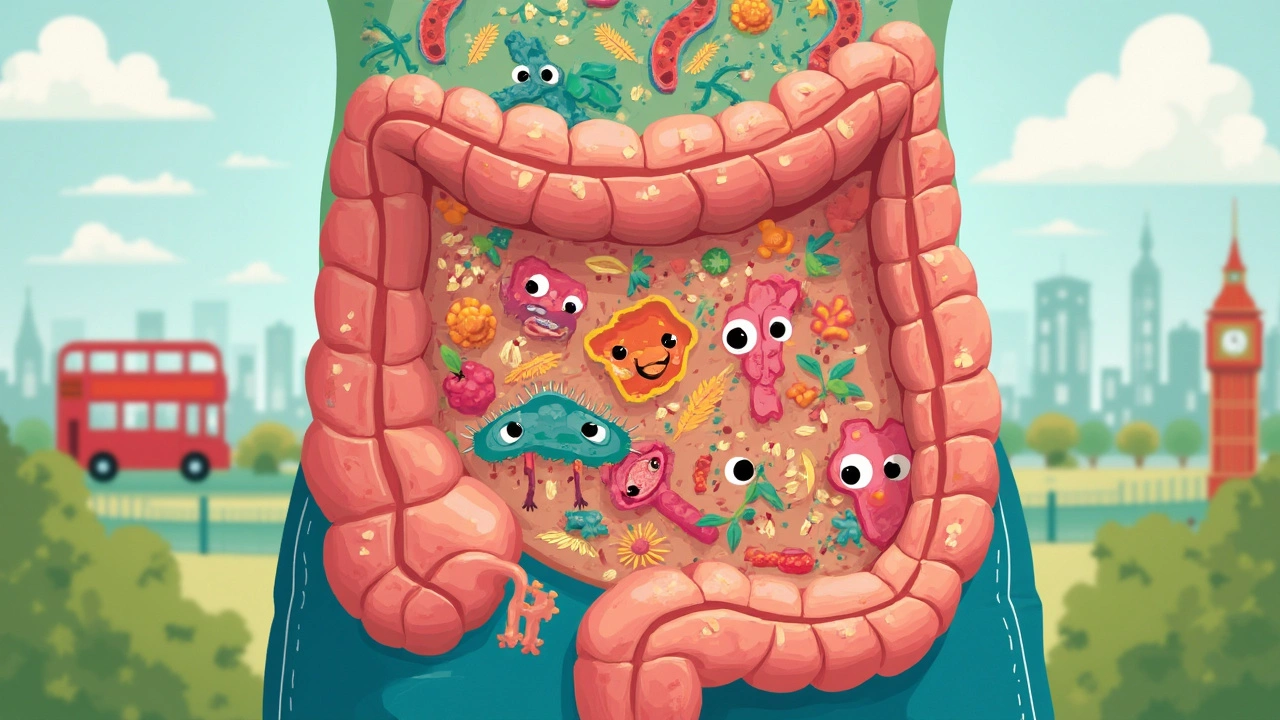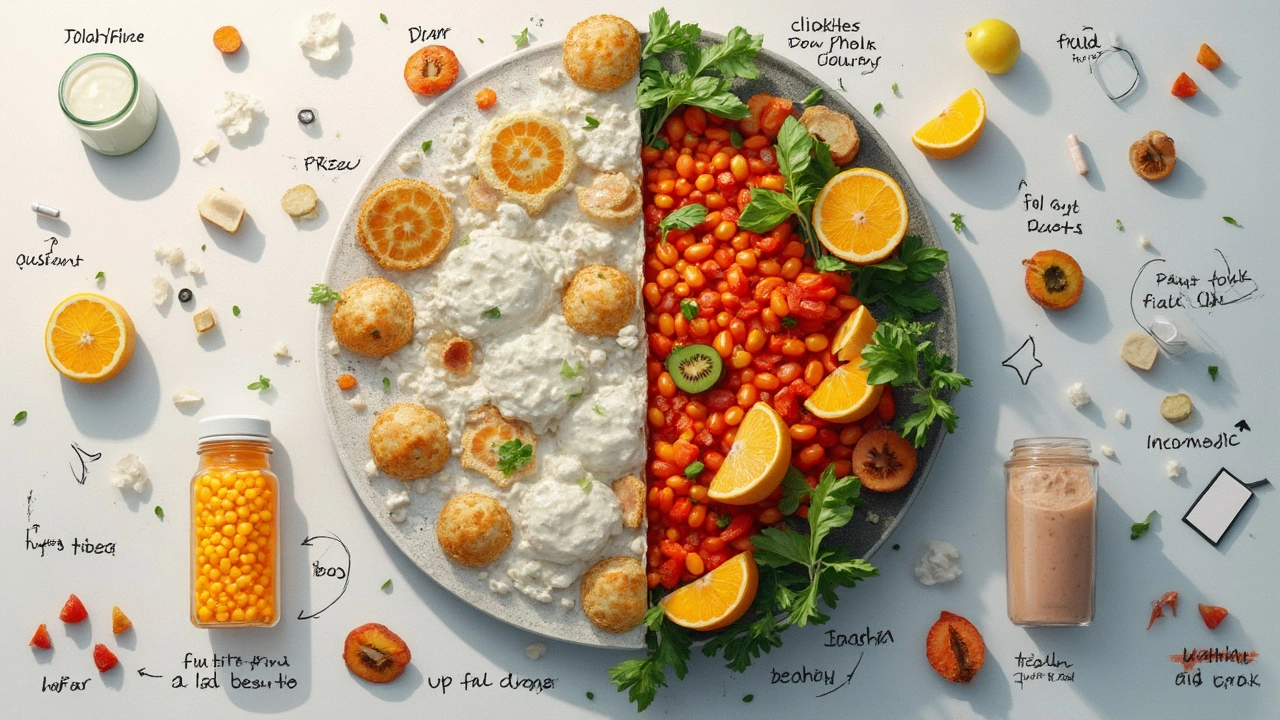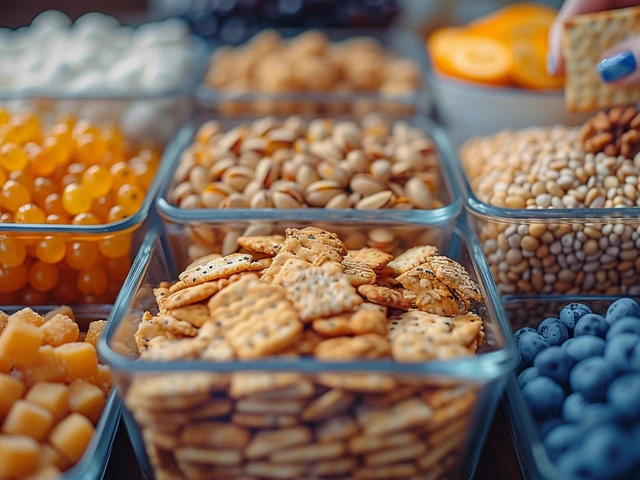If fat-burning teas or crash diets left you frustrated, you might want to pay closer attention to your gut. Here’s a surprise: what happens in your digestive system could make or break your weight goals—even if you’re counting every calorie.
Your gut isn’t just a food pipe. It’s home to trillions of tiny bacteria, fungi, and other critters. This is the gut microbiome, and it acts like an extra organ that plays a huge role in how your body deals with food, stores fat, and feels hunger. Researchers have even found that people with more diverse gut bacteria are less likely to struggle with obesity.
So, what’s throwing things off? It could be anything from antibiotics to stress, to not eating enough fiber. The wrong mix of gut bugs can slow your metabolism, trigger cravings for junk food, and even make your body hang onto every calorie you eat. But the good news is that it’s possible to shift your gut in a healthier direction—and you don’t have to chug questionable supplements to do it.
- What Really Happens in Your Gut
- Microbes: The Unsung Heroes (or Villains) of Your Weight
- Signs Your Gut Might Be Messing With Your Progress
- Fixes You Can Start Right Now
- Mythbusting: Gut Health Trends That Don't Work
What Really Happens in Your Gut
Think of your gut as a busy city full of trillions of residents—mostly bacteria, but also some yeast and even viruses. All these microbes make up your gut health system, otherwise known as the microbiome. Their main job? Help turn your food into the stuff your body can actually use.
When you eat, your gut bacteria break down parts of your food—especially fiber that your stomach can’t handle alone. As they do this, they create short-chain fatty acids. These little guys play a massive role in keeping your gut lining healthy and can even help lower inflammation, which matters a lot for weight management.
Gut bacteria actually talk to your brain. Sounds wild, but it’s true. Certain microbes send signals that can make you feel hungry or full—they literally mess with your cravings. Flip side: an unhealthy balance in your microbiome can make it hard to know when you’ve really had enough to eat.
Why does this matter? Well, studies show that folks with a richer mix of gut bacteria tend to have an easier time maintaining their weight. For example, a research team from Sweden found that people with less diversity in their gut microbiome gained weight more easily over a decade—same lifestyle, different bugs.
| Gut Microbiome Fact | Why It Matters |
|---|---|
| Over 100 trillion microbes live in your gut | They outnumber your human cells by at least 10 to 1 |
| 70% of your immune system is in your gut | Good microbes keep bad bugs in check and reduce inflammation |
| Gut bacteria make up to 95% of your body’s serotonin | Moods and appetite are both linked to gut health |
Bottom line: the everyday choices you make, from what you eat to your stress levels, have a real impact on your gut health and—by extension—how your body deals with weight management. Eating a variety of plant-based foods and going easy on processed snacks can make a world of difference for your gut.
Microbes: The Unsung Heroes (or Villains) of Your Weight
Millions of tiny organisms inside your gut actually make a bigger difference than your fancy scale or calorie counter. Those gut health microbes help digest food, produce vitamins, and even ‘talk’ to your brain about hunger. But here’s the kicker—some bacteria are your weight-loss allies, while others hold you back.
Studies show folks with a wide variety of gut microbiome types usually have a healthy weight. But if ‘bad’ bacteria take over, you’re more likely to struggle. For example, too many Firmicutes (a type of gut bug) compared to Bacteroidetes has popped up in people with obesity. It’s not just a fun fact: these bacteria influence how much energy you extract from what you eat.
| Bacteria | Linked to... |
|---|---|
| Firmicutes | More calorie absorption, higher obesity risk |
| Bacteroidetes | Better weight control, leaner body types |
Here’s where it gets wild. Some of these microbes break down fiber and turn it into short-chain fatty acids, which can help signal fullness. Others can actually mess with these signals, leading you to eat more without realizing it. Plus, gut bacteria make chemicals that shape your mood—ever hear of ‘emotional eating’? Thank your gut.
So, if you want to support weight management, don’t just count calories. Think about ways to nurture the good guys in your gut, crowd out the harmful ones, and let your microbiome be your secret weapon.

Signs Your Gut Might Be Messing With Your Progress
You can be nailing your workouts and counting every bite, but if your gut health is dodgy, losing weight might feel impossible. Your gut sends signals all over your body, especially to the parts that control how hungry or full you feel. If this system is out of whack, you’ll notice.
Here are some clear signs your gut health might be holding you back:
- Bloating or constant belly discomfort: Not the normal full feeling after a big meal, but regular gassy, crampy, off days. If your stomach often feels unhappy, your gut bacteria might be off balance.
- Unexplained weight changes: Struggling to lose a few pounds or gaining weight despite similar eating habits? A disrupted microbiome can slow your metabolism or even make your body hold onto fat.
- Crazy cravings – especially for sugar: Gut bacteria actually influence what you want to eat. Some strains feed off sugar and send signals to your brain to eat more of it, making it way harder to cut back.
- Low energy or ‘brain fog’: If you’re dragging through your day even after sleeping okay, it could be your gut not absorbing nutrients properly.
- Bathroom troubles: If you swing between constipation and diarrhea, or if something just feels ‘off,’ it’s often a gut issue at the root.
This isn’t just guesswork. Yale researcher Dr. Daniel Merenstein put it bluntly:
"Gut bacteria influence almost every part of metabolism – from the way our bodies break down food to how much fat we store. If your gut’s off, your weight might be too."
Here’s a quick table showing how gut issues link to common weight management struggles:
| Gut Issue | Possible Effect on Weight |
|---|---|
| Low diversity in gut bacteria | Higher risk for weight gain |
| Frequent antibiotics | Changes metabolism, possible weight increase |
| Craving sugar/junk food | More likely to overeat, harder to lose weight |
If these signs ring true, it’s not about willpower—your gut could be running the show. Fixing these imbalances is doable, and you’ll probably notice your cravings or energy shift once your gut’s back on track.
Fixes You Can Start Right Now
Let’s talk action—the things you can do right now to help your gut health and support your weight management goals. No crazy supplements or fad diets required.
- Add more fiber: Gut bacteria love fiber. Choosing foods like oats, beans, lentils, berries, seeds, and leafy greens gives your microbes the fuel they need. Most people only get half the daily fiber they should (adults need about 25-30 grams a day). Fiber not only feeds good bacteria; it also helps you feel full longer, which is great for weight control.
- Eat fermented foods: Yogurt with live cultures, kefir, kimchi, miso, and sauerkraut are packed with good bacteria called probiotics. Including these a few times a week can boost your gut’s diversity, according to a Stanford study from 2021 showing increased gut microbiome diversity and reduced inflammation after just ten weeks of regular fermented food intake.
- Cut back on ultra-processed foods: Chips, sugary cereal, and packaged snacks don’t just go easy on your waistline—they also lower the number of good bacteria in your gut. Try to make processed snacks the exception, not the rule. Simple switches, like fruit or nuts instead of cookies, add up fast.
- Don’t skip meals: When you eat on a regular schedule, you support a healthy routine for your microbes. Skipping meals or loading up late at night can mess with your metabolism and spit out less-friendly gut bacteria.
- Hydrate: Water helps fiber do its thing and keeps your digestion moving. Aim for about 8 cups a day, more if you’re active or it’s hot outside.
Here’s a quick glance at how these simple swaps can help your weight management:
| Habit | Impact on Gut + Weight |
|---|---|
| More fiber | Feeds good bacteria, supports fullness |
| Fermented foods | Boosts microbiome diversity |
| Fewer processed foods | Reduces "bad" bacteria, lowers inflammation |
| Regular meals | Stabilizes metabolism and hunger hormones |
| Hydration | Improves digestion and gut barrier |
What you eat, how you eat, and even when you eat can all change your gut for the better. Try adding just one or two of these habits this week and see how you feel—your gut (and your scale) will thank you.

Mythbusting: Gut Health Trends That Don't Work
Let’s weed out some of the nonsense flooding social media about gut health and weight management. Not everything labeled “gut-friendly” is worth your money—or your gut microbes.
First up, detox teas and laxative cleanses. These are super popular, especially around New Year’s, but there’s zero real science saying they help your microbiome or support real, lasting weight loss. Often, they can dehydrate you and mess with your gut bacteria balance. The British Dietetic Association straight up says,
"Teatoxes do not boost your metabolism or help you lose fat. Any weight loss is likely due to water loss or spending more time in the bathroom."
Next: quick-fix probiotic supplements. There are a few strains that actually help, but not all probiotics are created equal. Most off-the-shelf bottles have strains that don’t even survive stomach acid. Plus, the dose and type that work for someone else might do nothing for you. One 2023 review in The Lancet noted that the real benefits come from consistent, habitual changes—like eating more fiber and fermented foods—rather than pill-popping.
Kombucha and other trendy “gut shots” aren’t magic drinks. Yes, some have friendly bacteria, but a single bottle won’t overhaul your microbiome overnight. Many of these drinks also have hidden sugar, which isn’t doing your gut or your waistline any favors.
It’s also easy to fall for DIY “gut reset” diets that tell you to cut out entire food groups. Going too extreme can actually shrink the diversity of your gut microbes, which is the opposite of what you want. In the end, your gut thrives on variety—including carbs, veggies, fruit, and even some healthy fats.
Here’s a quick glance at what works (and what really doesn’t):
- Not effective: Quick cleanses, harsh fasting, all-liquid ‘detoxes’
- Can help: High-fiber foods (beans, whole grains), diverse fruits and veggies, yogurt with live cultures
- Questionable: Most commercial probiotic drinks, especially if they’re loaded with sugar
If you’re aiming for better gut health and real weight management, skip the hype. Build slow and steady habits—your gut microbes, and your jeans, will thank you.







